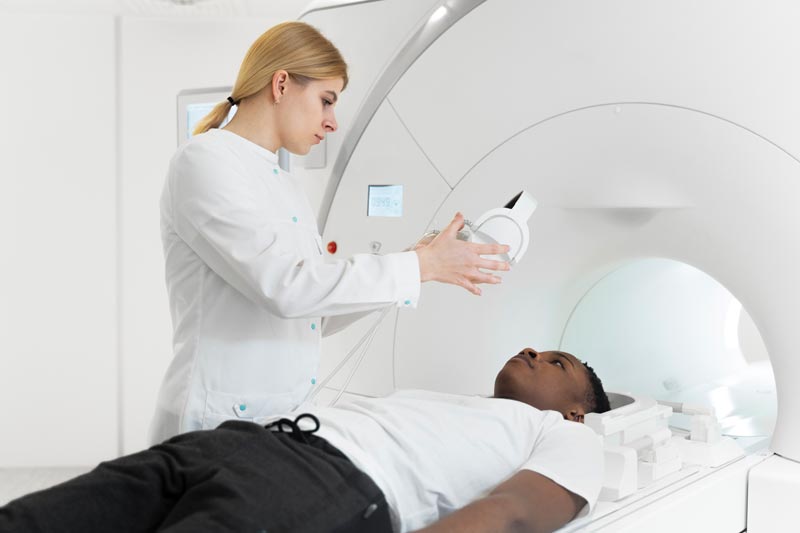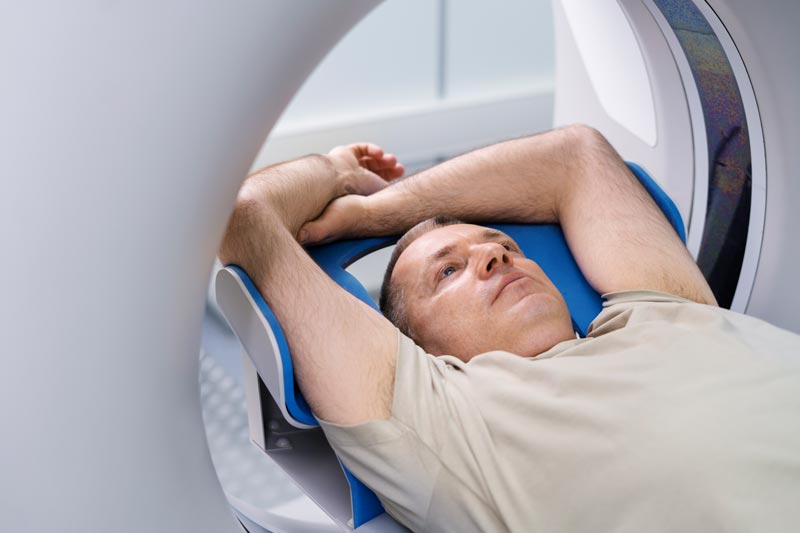Transcranial Magnetic Stimulation (TMS) offers a non-invasive, FDA-approved treatment for patients with treatment-resistant depression. However, while many anticipate positive outcomes, some may be surprised to experience unexpected side effects. Although often temporary and manageable, these effects underscore the importance of patient-provider communication throughout treatment.
Here are the seven surprising side effects of TMS treatment, each with insights on what patients may experience, why these effects occur, and how best to manage them.
Table of Contents
Key Takeaways
What to Expect During TMS Treatment
7 Effects of TMS Treatment and What to Anticipate for a Positive Experience
1. Changes in Sleep Patterns
2. Unexpected Emotional Responses
3. Enhanced Sensitivity to Sound
4. Altered Taste Perception
5. Unusual Sensations During Treatment
6. Increased Energy Levels Post-Treatment
7. Depression Remission as an Unexpected Outcome
When to Talk to a Healthcare Provider About Side Effects
Tips for Managing Uncommon TMS Side Effects
Frequently Asked Questions
Discover the Life-Changing Benefits of TMS Treatment Today!
| Key Takeaways ✔ TMS treatment can impact sleep, leading to either more restful sleep or difficulty winding down at night. ✔ Some patients experience sudden emotional shifts, like feelings of calmness or brief waves of sadness or joy. ✔ Everyday sounds may feel more intense or sharp, and loud environments can become temporarily uncomfortable. ✔ Certain flavors may taste stronger or, conversely, more muted, likely due to TMS’s effect on sensory processing. ✔ During treatment, patients often feel mild tapping or tingling on the scalp and, at times, a slight warmth. ✔ Post-treatment, some individuals report increased alertness and motivation, which can boost productivity and physical activity. ✔ TMS can lead to full remission in certain cases, with rapid symptom improvement for some patients. |
What to Expect During TMS Treatment
TMS treatment is a non-invasive procedure designed to stimulate specific brain areas linked to mood regulation, notably the prefrontal cortex. This uses magnetic pulses to reactivate underperforming brain regions, alleviating symptoms of depression and other mental health conditions.
Around 50-60% of individuals with medication-resistant depression experience significant improvement with TMS, with approximately one-third achieving full remission of symptoms. Here’s a breakdown of what patients can expect during TMS treatment:
- Initial Consultation and Preparation: Before starting TMS treatment, patients undergo an initial consultation to evaluate their suitability for the therapy. This assessment includes discussing medical history, current symptoms, and setting treatment goals with the healthcare provider to ensure the best outcome.
- Personalized Mapping of Treatment Area: During the first session, a technician maps out the exact area of the brain to be stimulated. Using specialized equipment, they locate and mark the prefrontal cortex region. This ensures that the magnetic pulses are precisely targeted to maximize treatment effectiveness.
- Positioning and Comfort Adjustments: Patients are seated in a comfortable chair, and adjustments are made to ensure the best possible positioning of the TMS machine. This includes the technician positioning the magnetic coil near the scalp to target the designated area accurately.
- Short Sessions and Breaks: Each TMS session lasts approximately 20 to 40 minutes, depending on the individual’s treatment plan. Sessions are generally scheduled five times per week over several weeks. Patients have the opportunity to rest or take brief breaks if needed, especially during the initial sessions.
- Gradual Improvement Over Time: TMS treatment is a cumulative process, with benefits gradually appearing over the course of multiple sessions. Most individuals start noticing improvements in mood and mental clarity after several weeks, with some experiencing increased energy and motivation.
- Monitoring and Check-ins: Throughout the treatment period, patients regularly check in with their healthcare provider to monitor progress and discuss any side effects. These sessions provide an opportunity to adjust the treatment plan if necessary and to ensure that the patient is achieving the best possible outcome.
7 Effects of TMS Treatment and What to Anticipate for a Positive Experience
Reflecting its growing adoption, the global TMS system market is projected to expand at a compound annual growth rate (CAGR) of 9.0% from 2023 to 2030. But while TMS treatment is effective in alleviating symptoms of depression and other mental health conditions, it can also bring about some unexpected side effects. Fortunately, most of these effects are manageable and don’t pose any serious health risks to individuals on TMS.
1. Changes in Sleep Patterns
One lesser-known effect of TMS treatment is its influence on sleep. Patients often report changes in their sleep patterns, which can vary widely:
- Improved Sleep Quality: Some individuals find that TMS treatment helps them achieve deeper, more restful sleep. As mood improves, symptoms like insomnia or restless sleep may lessen, resulting in better-quality rest.
- Disrupted Sleep Cycles: Conversely, some patients notice disruptions in their sleep patterns. Increased energy levels after sessions can make it difficult to wind down, leading to delayed sleep onset.
The changes in sleep are believed to be tied to how TMS treatment affects brain areas responsible for regulating circadian rhythms. As brain activity adjusts, the body’s internal clock may also shift. To manage these sleep changes, individuals can:
- Stick to a Consistent Routine: Following a regular sleep schedule can help the brain and body adjust more quickly.
- Avoid Stimulants: Reducing caffeine intake, especially in the afternoon, can minimize sleep disruptions.
- Practice Relaxation Techniques: Activities like deep breathing and mindfulness exercises before bed can help ease the transition to sleep.
A healthcare provider can provide personalized tips for managing sleep changes, ensuring TMS treatment remains a positive experience.
2. Unexpected Emotional Responses
While TMS treatment is known for improving mood, it may also prompt surprising emotional shifts, some of which are unexpected:
- Sudden Calmness or Contentment: Patients sometimes feel an overwhelming sense of calm or contentment during or after treatment. This positive shift might come as a surprise, especially for those who have long struggled with mood disorders.
- Emotional Waves: Some individuals may experience spontaneous emotional waves, like brief moments of sadness or elation, that are unrelated to current thoughts or surroundings.
These emotional shifts are likely due to the brain’s ongoing adjustment to TMS treatment. As magnetic pulses stimulate areas related to mood, different emotions may emerge as the brain begins to regulate more effectively. These shifts are generally temporary and become less frequent over time. To navigate these changes, patients can:
- Acknowledge and Accept: Recognizing that these emotions are normal can make them easier to handle.
- Journal Emotions: Documenting feelings can help identify any patterns and allow for better communication with healthcare providers.
A healthcare provider can reassure patients about these changes and offer coping strategies tailored to their emotional experience.
3. Enhanced Sensitivity to Sound
An unexpected side effect of TMS treatment for some patients is an increased sensitivity to sound:
- Sharpness of Everyday Sounds: Individuals might notice that regular sounds, such as typing or traffic, feel more intense.
- Sensitivity to Loud Environments: Busy or noisy settings may feel overstimulating, leading to temporary discomfort or mild irritation.
This heightened auditory sensitivity may occur because TMS treatment affects the brain’s sensory processing centers, which amplifies responses to auditory input. While the effect is typically mild and short-lived, it can be surprising. Patients experiencing this heightened sensitivity can try:
- Using Ear Protection: Earplugs or noise-canceling headphones can help reduce sound intensity during sensitive periods.
- Practicing Deep Breathing: Taking a few deep breaths in noisy settings can help lessen overstimulation.
Discussing these experiences with a healthcare provider can clarify if adjustments to treatment might lessen sound sensitivity.
4. Altered Taste Perception

A rare but surprising effect of TMS treatment is a temporary change in taste perception. Although not widely reported, some individuals notice slight alterations in how they perceive flavors:
- Enhanced Taste: Certain flavors may seem stronger, with foods tasting more intense or vibrant than usual.
- Muted Flavors: Conversely, some individuals may experience a reduction in taste sensitivity, with foods tasting less pronounced.
This change in taste perception is likely due to how TMS treatment impacts sensory processing areas of the brain. If these taste changes persist, discussing them with a healthcare provider can help. Meanwhile, individuals can manage this by:
- Experimenting with Mild Flavors: Choosing foods with subtle flavors may make meals more enjoyable.
- Keeping Hydrated: Proper hydration can also improve sensory sensitivity and may help mitigate taste changes.
With time, most patients find that their sense of taste returns to normal as they adjust to TMS treatment.
5. Unusual Sensations During Treatment
As the magnetic coil is placed close to the scalp during TMS treatment, some patients report experiencing unique physical sensations:
- Tingling or Tapping: Many describe feeling a mild tapping or tingling on the scalp as the magnetic pulses are delivered.
- Warm Sensation: Some individuals may notice a slight warmth on their scalp, which can be unexpected but is generally harmless.
These sensations occur because the magnetic pulses stimulate nerves and muscles around the treatment area, which may feel unusual initially. Tips for managing these sensations include:
- Ask for Adjustments: The TMS technician can make minor adjustments to increase comfort.
- Practice Relaxation: Focusing on breathing can help patients relax during sessions, making these sensations easier to tolerate.
Understanding these sensations as normal responses to TMS treatment can help individuals feel more at ease. It’s also crucial to be vocal about comfort levels to ensure the best experience possible.
6. Increased Energy Levels Post-Treatment
For many, one of the pleasant side effects of TMS treatment is an increase in energy levels. Patients frequently report feeling more alert and motivated following sessions, which enables them to enhance various aspects of their lives:
- Improved Productivity: Individuals may find it easier to complete tasks and feel more motivated throughout the day.
- Enhanced Physical Activity: With more energy, patients might be inclined to engage in physical activities, which can further boost mood and overall well-being.
This increase in energy is likely a result of the treatment’s positive impact on mood and brain stimulation. To make the most of this energy boost, individuals can:
- Set Productive Goals: Channeling newfound energy into specific goals can improve productivity and focus.
- Engage in Physical Exercise: Physical activity can help balance energy levels and promote better sleep.
If energy levels become too high and interfere with daily routines, healthcare providers can suggest ways to moderate this effect.
7. Depression Remission as an Unexpected Outcome
Although TMS treatment is commonly known to reduce depression symptoms, some patients are pleasantly surprised by full remission:
- Complete Symptom Relief: For a subset of individuals, TMS treatment leads to a significant reduction in symptoms. This leaves them feeling mentally balanced and positive, which can be a surprising experience.
- Unexpectedly Rapid Results: Some patients notice that their symptoms improve faster than anticipated. This fast result can be overwhelming for some individuals who have been struggling for a long time.
This outcome underscores the effectiveness of TMS treatment for certain individuals. However, results vary, with some patients experiencing gradual improvement and others finding complete symptom relief. Communicating these changes to a provider can help set realistic expectations and keep treatment aligned with personal goals.
When to Talk to a Healthcare Provider About Side Effects
Understanding when to reach out to a healthcare provider about side effects of TMS treatment can be essential for a safe and positive experience. While some effects are mild and temporary, others may require professional guidance. Providers can offer reassurance, coping strategies, and treatment adjustments if needed.
Here are some specific instances when it’s advisable to consult a healthcare provider in Danbury, CT:
- Increased Fatigue or Low Energy: If TMS treatment leads to prolonged fatigue or low energy that affects daily activities, it’s advisable to consult a provider. They can recommend strategies for managing energy levels and assess if any adjustments to treatment might help.
- Intense Emotional Shifts: While some emotional fluctuations are normal, intense or prolonged feelings of sadness, agitation, or euphoria should be discussed with a healthcare provider. They can help determine if these changes are part of the treatment adjustment process or if other support is needed.
- Changes in Appetite or Weight: Some individuals may experience changes in appetite or fluctuations in weight during TMS treatment. If these changes feel noticeable or concerning, discussing them with a provider can help, as they may offer guidance on dietary adjustments or lifestyle tips to support well-being during treatment.
- Unusual Physical Sensations During or After Treatment: If patients feel any persistent or uncomfortable physical sensations during or after TMS sessions—beyond the typical tingling or tapping—reaching out to a provider is essential. These sensations may warrant an assessment to ensure the treatment remains comfortable and safe.
- Prolonged Headaches or Discomfort: While mild headaches are common, persistent or intense headaches following sessions should be discussed with a provider. They can recommend relief options or adjust treatment parameters to reduce discomfort.
Tips for Managing Uncommon TMS Side Effects
Navigating the unexpected side effects of TMS treatment is achievable with the right strategies. Here are some helpful tips:
- Track Side Effects: Keeping a log of symptoms, emotional responses, and physical sensations can be insightful. This record provides valuable data for healthcare providers to make any necessary treatment adjustments.
- Maintain Regular Appointments: Consistency with TMS treatment sessions helps the brain adjust gradually, which can potentially reduce the intensity of side effects over time.
- Practice Relaxation: Engaging in deep breathing, mindfulness, or meditation exercises can help manage sensory and emotional changes.
- Prioritize Rest: With increased energy levels or sleep disruptions, focusing on quality rest and hydration becomes essential to maintain balance.
- Stay Open with Your Provider: Open communication with a provider ensures that unexpected effects are addressed promptly, making the TMS treatment journey more comfortable and effective.
Frequently Asked Questions

How long do the effects of TMS treatment last?
The effects of TMS treatment can last anywhere from several months to over a year, depending on the individual. Many patients experience symptom relief and may not require immediate follow-up. For those who do, periodic maintenance sessions can help sustain the benefits.
Is TMS treatment safe for long-term use?
Yes, TMS treatment is generally safe for long-term use, as it is non-invasive and does not involve medication. Unlike other treatments, it specifically targets mood-regulating areas of the brain. Regular monitoring with a provider ensures optimal results and safety over time.
Can TMS treatment cause memory loss?
No, TMS treatment is not known to cause memory loss. Unlike ECT (electroconvulsive therapy), which can affect memory, TMS is a more targeted approach. It stimulates specific brain regions without impacting memory-related areas.
How soon do you feel the effects of TMS treatment?
Many patients begin to notice subtle changes within 2 to 4 weeks of starting TMS sessions. However, full effects may take the entire course of treatment to manifest. Patience is often key, as improvements are gradual but can be significant.
Is TMS treatment effective for anxiety?
TMS is primarily approved for treating depression but has shown potential in alleviating anxiety symptoms as well. Studies are ongoing to explore its full benefits for anxiety. Discussing individual suitability with a healthcare provider is recommended for the best outcome.
Discover the Life-Changing Benefits of TMS Treatment Today!
If you’re considering TMS treatment and want to learn more about how it can help you or a loved one, reach out to Contemporary Care Center in Danbury, CT. Our experienced team is committed to providing compassionate, tailored care to meet each patient’s unique needs. Don’t wait—schedule a consultation with Contemporary Care Center in Danbury, CT, today and discover how TMS treatment could be a life-changing option for you!



